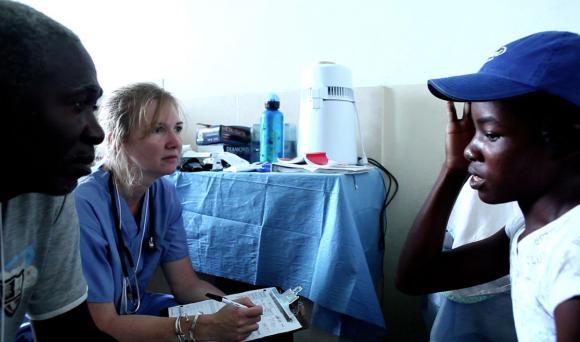PROVIDENCE, R.I. [Brown University] — In the new documentary short A Part of the World about her volunteer relief work in Haiti, Dr. Lisa Denny describes tragedies like the woman who made it to the front of a long clinic line holding a baby who didn’t survive the wait. Yet such stories aren’t even the most haunting quality of the film. Instead it’s the bleak moral tension that compels Denny to serve the desperate need there even as she laments the economically crippling dependency that she sees such efforts prolonging.
“It feels really good to come down and give time and give service and meet people and touch people,” she says in the film, which debuts online Nov. 14. “It just feels like this very pure giving and in an ideal world that could get Haiti up off the ground, but it hasn’t. But that gets into the bigger question of whether it possible to truly give altruistically. I think that is the really tricky part about volunteering. How do you help without hurting?”
Denny, clinical assistant professor of family medicine in the Alpert Medical School, and the executive producer, brother-in-law Keir Moreano, don’t presume to answer that question or dissipate the tension. They only document the dilemma, which is known to global health experts but often unappreciated by the general public.
“This gets you into the issue very much from a layperson’s perspective: What can I personally in Barrington, R.I., do to help Haiti?” said the veteran of seven trips to the struggling Caribbean nation. “The ending of the film bothers me a little bit, just because I’m completely unresolved. It would feel much better to be putting this out there saying, ‘And here’s the answer.’”
The idea to make a documentary came together at the dinner table. Moreano is a documentary filmmaker who recognized that his sister-in-law’s trip to Haiti in 2011, a year after the earthquake that killed more than 200,000 people, could be an important subject. Only during the filming did they realize that the theme of whether relief begets a destructive dependence would become central.
The film includes interviews with a local doctor whose obstetrics and gynecology practice has suffered from a glut of free competition and food relief workers who say that a deluge of food aid has left the country importing donated rice when it once exported the crop.
Despite her misgivings and her lack of answers, Denny does not plan to abandon Haiti. She’s being going since the early 1990s when her frequent interactions with Hatians during a summer job at a Boston hospital motivated her to learn Creole.
Next time she goes, she said, she’ll go where there are no doctors. She doesn’t want to undercut colleagues with free services or local pharmacies with free supplies.
“I think my next step would be going to more rural Haiti and hopefully leaving some skills behind,” she said. “If I can leave some blood pressure cuffs and teach people about diet. Teach a village how to check for high blood pressure and then if they find it, what are the things that are always available and free to them that they can do to help. Something like that feels like it would be a more worthwhile thing to leave behind.”
It’s a different vision than people often have about relief in Haiti. But there has to be some way to help without hurting.

